Introduction:
Some homeowners believe that pressure washing is a fast and straightforward solution for cleaning their roofs. What they often do not realize is that this fast “solution” often leads to costly and harmful pressure washing damage. High-pressure water can break down shingles, drive water into the roof deck, and void your roofing warranty.
The bottom line is that there are far too many risks in high-pressure roof cleaning that far outweigh the short-term visual improvements. Although high-pressure roof cleaning works temporarily, it can lead to structural issues, hidden leaks, and long-term failure of your roof.
2. What Really Happens During Pressure Washing
2.1 Granule Loss and Surface Thinning
Asphalt shingles have a coating of granules providing UV protection from the sun. Also, they are there for extreme weather like heavy rain and wind. When pressure washing damage occurs, it’s because granules are stripped away, leaving shingles thin and naked and more likely to wear. Overall, the damage is shortens your roof’s lifespan and is one of the most common and irreversible types of damage caused by pressure washing.
2.2 Shingle Edges and Seal Strip Damage
The force of high-pressure cleaning can easily lift or break the adhesives holding down shingles. This way, pressure washing damage breaks the watertight seal to your roof making it more vulnerable to wind uplift and leaks with storm conditions. After you violate or break the sealing system your roofing structure will be compromised.
2.3 Moisture Infiltration and Mold Growth
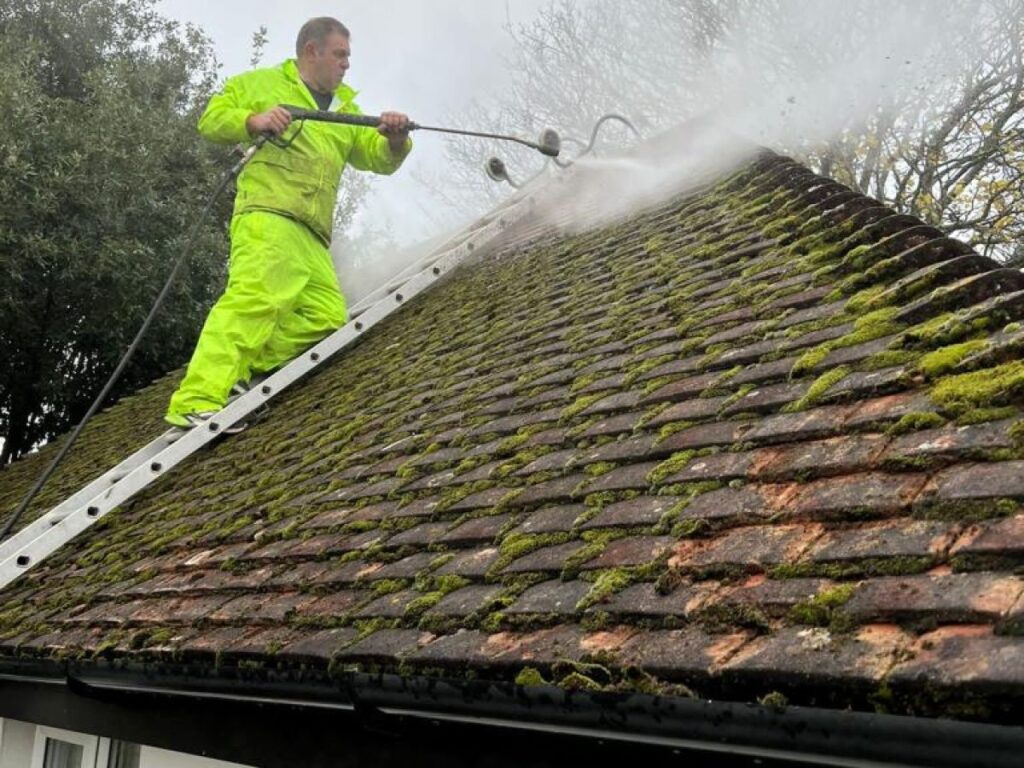
Probably the most dangerous kind of pressure washing damage is when the high-pressure water is forced under the shingles, flashing or vents. This causes wetting in the roofing layers which leads to mold and mildew and ultimately wood rot. In this situation we have a problem that cannot be easily seen and therefore is not noticed until something tangible occurs, by that time the structural problems will already be serious.
2.4 Tile Roof Cracking
Tile roofs and slate roofs are even more vulnerable to damage from pressure washing because of the brittle nature of the roof coverings. It is also common for high-pressure water to crack or break the tiles or slates and force water underneath roof coverings, resulting in either a leak or a slow decay process that is hidden. The greatest problem with this scenario is it is not just cosmetic damage. Pressure washing damage can and usually results in the damage to a whole tile or slate roof that can lead to costly tile replacement and structural repairs.
2.5 Premature Aging and Voided Warranty
For many roofing warranties, the use of high-pressure washing can void that warranty immediately. As a result of pressure washing, the aging of shingles and tiles can be accelerated for multiple reasons. Basically, you have stripped away the protective layers and weakened the roof. What might seem like an innocent cleaning attempt could end up causing your roof to prematurely fail, leading to an expensive replacement.
3. The Real Risks to Asphalt Shingles and Tile Roofs
3.1 Asphalt Shingles and Pressure Washing Damage
In general, asphalt shingles sustain the most significant damage from pressure washing than other roofing materials. The high-pressure water can strip off significant amounts of granules, lift the seal strips attached to shingles, and drive moisture under the shingle surface. These detriments can weaken the overall integrity of your roof and drastically shorten the life of your installation. Often, the signs of pressure washing damage to asphalt shingles can show up just weeks after pressure washing in ways that can appear as bald areas, curled edges, and even early leaks.
3.2 Tile, Slate, and Metal Roof Risks
Tile and slate roofs also suffer damage from pressure washing. Being brittle materials, they can crack or break when subjected to high pressure. Metal roofs are structurally stronger than tile or slate; however, pressure washing can strip protective coatings off metal roofing that lead to rust, corrosion, and future deterioration.
If you have ever asked, can pressure washing damage shingles?, it is a resounding yes- especially when it comes to asphalt and composite materials. This is why homeowners are looking for safer alternatives to prevent any damage while still looking for a long-term solution for their roof cleaning such as soft roof cleaning in Salem OR.
4. The Safer Choice: Why Soft Wash Is Better for Roofs
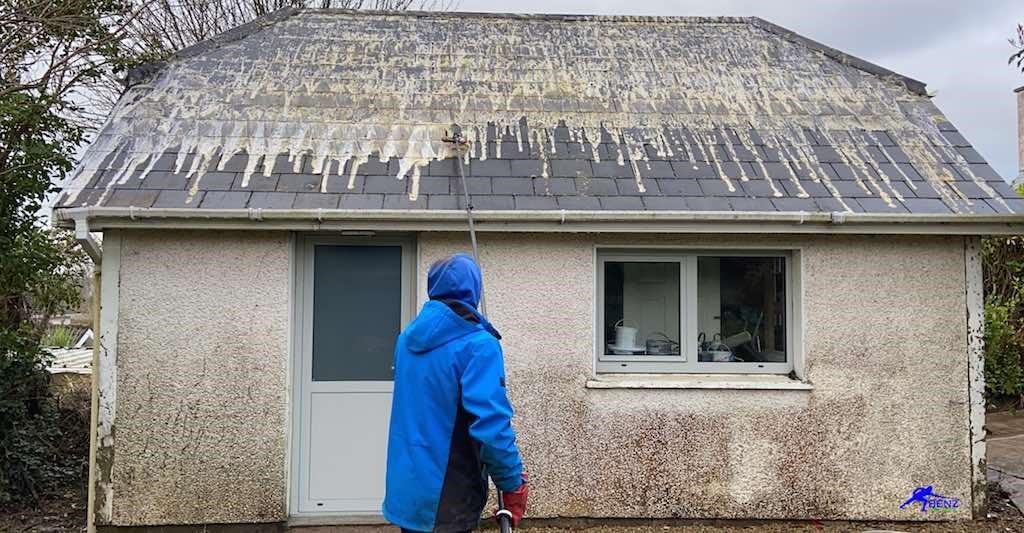
Soft washing is a low-pressure, highly effective roof cleaning method that kills mold, algae, mildew, and moss at the root with special eco-friendly solutions without causing any high-pressure damage by washing it away with extreme pressure. Instead of blasting away the things growing on your roof with pressure, soft washing lets you get into the heart of the issue by fully cleaning the area down to the root without ripping away protective granules or damaging shingles, tiles, or coatings.
They include:
- Uses less than 500 psi of pressure and eliminates the possibility of pressure washing damage.
- Prevents granules being washed away and cracking tiles with powerful blasts of water spray.
- Kills organic growth at the source for longer-lasting results.
- Often complies with the roofing manufacturers warranty.
- Safe on all roof types i.e., asphalt, tile, slate, and metal.
Due to the risks of using higher pressures for cleaning, soft washing has become the roof cleaning of choice for roof cleaning. No-pressure wash Hillsboro services are in demand for homeowners in the Hillsboro area looking to clean their roofs without worrying about the damage from pressure washing.
5. When Is Pressure Washing Safe for Roofs?
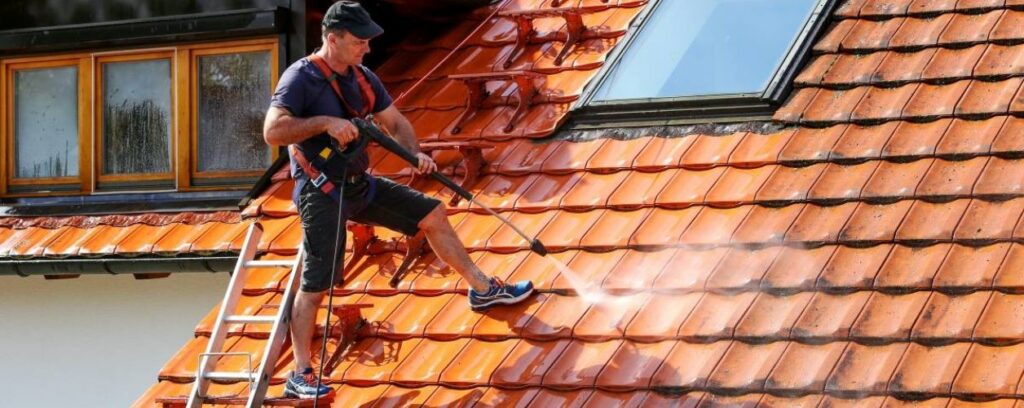
While pressure washing damage is a serious risk for most roof types, there are the rare exceptions where it may be used — but only with extreme caution:
- Flat roofs constructed with materials that are intended for controlled rinsing (cleaning)
- Commercial roofing systems that are specially designed for pressure cleaning
- Newly installed roofs without any moss or mold, or shingle wear
Even with these roof types and situations extreme caution is absolutely required.
There still remains a risk of pressure washing damages, and only qualified professionals that have the necessary experience should perform any pressure washing services. For the vast majority of residential roof cleaning, soft washing truly is the safest and most effective cleaning method to be used.
6. Choosing the Right Cleaning Service for Your Roof
The difference between hiring the right roof cleaning expert or company can mean the difference to you between a clean roof and thousands of dollars worth of damages after your roof gets blown off due to improper cleaning and preparations. Here is a list of best cleaning methods according to roof type:
| Roof Type | Best Method | Why Soft Washing Works Best |
| Asphalt Shingles | Soft Wash Only | Protects granules and sealing strips |
| Tile or Slate | Soft Wash or Soak | Prevents tile cracking and water penetration |
| Metal Roofs | Soft Wash Preferred | Keeps paint and coating intact |
| Flat Roofs | Low-Pressure Rinse | When allowed by manufacturer guidelines |
If you’re in Oregon, be sure to choose a provider with experience in soft roof cleaning in Salem OR or no-pressure wash Hillsboro. Avoid companies that promote high-pressure cleaning methods for roofing.
7. Real Homeowner Stories: Damage You Can Avoid
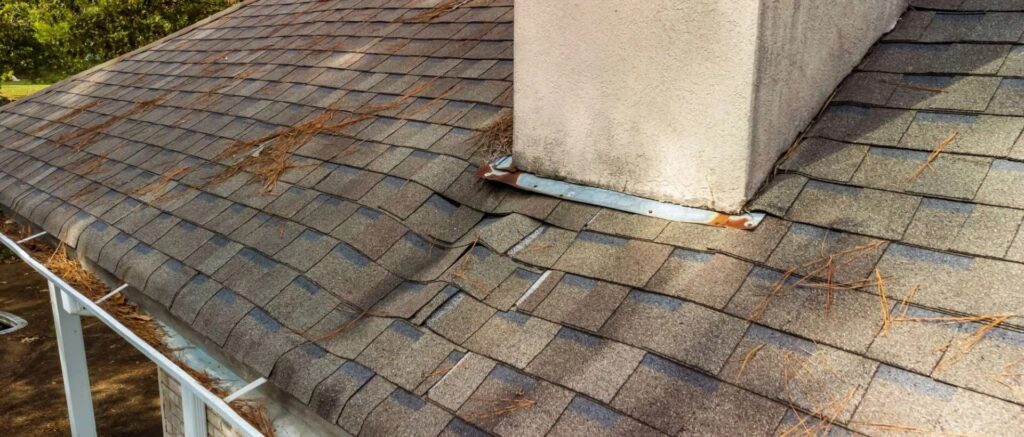
One homeowner in Salem hired a provider to pressure wash their asphalt shingle roofing and, within two weeks, they were seeing granules build up in their gutters and dark spots in their attic. The damage was pressure washing that stripped off the protective layer and let water in.
Another family in Hillsboro hired a local provider for soft roof cleaning and their roof was cleaned and free of moss, and their shingles remained completely intact-no cracks, no leaks, and no unexpected costs.
Takeaway: The right cleaning method makes a difference. And pressure washing often does more harm than good.
8. Key Takeaways: Avoid the Dangers of Pressure Washing Damage
- Leaks, broken tiles, and damaged shingles can all result from high-pressure cleaning.
- Asphalt and tile roofs are at highest risk to damage
- Most roof warranty policies have exclusions for pressure wash damage.
- Soft wash is more effective, safer, and more in line with warranties.
- Professionals trained in soft roof cleaning Salem OR and no-pressure wash Hillsboro, provide better but more importantly safer long-term results.
Request a Quote: Prevent Damage from Pressure Washing on Your Roof
One of your home’s biggest investments is its roof. Don’t risk damaging it by hiring someone with a pressure washer with no roofing experience. Instead:
- For a free roof cleaning consultation, give us a call right now.
- Make an online reservation for a smooth, safe wash.
- Choose Referred Roof Cleaning to protect your roof and pocket book
We proudly provide damage-free, reliable roof cleaning services to the nearby communities of Salem, Hillsboro, and all of Oregon.
Conclusion:
Sure, pressure washing looks like a quick way to clean your roof, but the reality is that a pressure washing often causes thousands of dollars in pressure washing damage; stripping breaking tiles, removing the protecting granules, and even nullifying warranties! The better, safer option is soft washing, which uses low pressure and a gentle cleaning solution to safely remove algae, moss, slime, and stains while prolonging the life of your roof. If you live in Salem OR or Hillsboro but you want roof cleaning service that will avoid pressure washing damage and protect your roof for years to come, then look to Referred Roof Cleaning for safe and professional soft wash services. Don’t spend again on expensive roof repairs, soft washing is the better way to a clean and durable roof.
Frequently Asked Questions (FAQs)
Is pressure washing illegal on roofs in Oregon?
No, it is not illegal to pressure wash roofs in Oregon, but many roof manufacturers strongly suggest not to pressure wash because it is easy to cause damage with a pressure washer. There may also be restrictions against pressure washing roofs in certain cities or by homeowners associations (HOA).
What is soft wash roof cleaning?
Soft washing is a safe method of removing mold, algae, and mildew from roofs by combining cleaning products with low water pressure. Soft washing does not use high pressure so there is no risk of pressure washing roof damage, and safe on every roof.
Can pressure washing damage shingles?
Indeed. You risk breaking the adhesive seal strips, removing the protective granules, and forcing water beneath the shingles if you pressure wash your roof. This causes leaks, and more importantly pressure washing damage may lead to premature roof failure.
Why is soft wash better for roofs?
A more comprehensive and safe cleaning technique is soft washing. It cleans roofs with low pressure and with chemical agents that kill any existing organic growth but won’t harm roofing materials. Soft washing avoids the liabilities of high pressure roof cleaning, and is often suggested by roofing manufactures if you want to keep your Holy Grail, warranty.
What are the risks of high-pressure roof cleaning?
High pressure roof cleaning has multiple risks, including granule loss, cracked tiles, moisture ingress that causes mold growth, voiding warranties, and of course reducing the overall lifespan of the roof. All of these are listed as pressure washing damage.
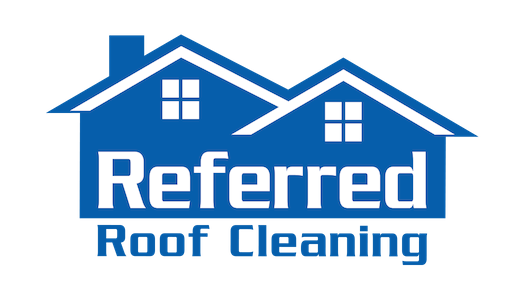
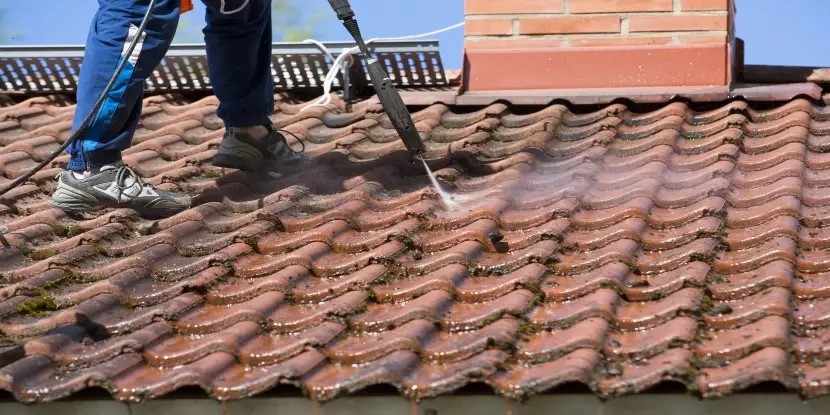
Recent Comments